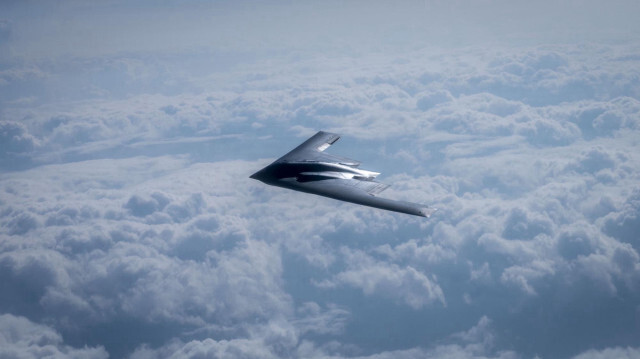

File photo
Operation serves both immediate tactical objectives, broader strategic goals, says Yemeni military expert Hisham Almaqdashi
The US' use of B-2 stealth bombers and advanced munitions on Yemen was a deliberate demonstration of “asymmetric” warfare capabilities and a message to regional “adversaries,” including Iran, according to Hisham Almaqdashi, a Yemeni military expert and former diplomat based in Washington DC.
On Wednesday, the US conducted airstrikes in Yemen, targeting five underground weapon storage sites linked to the Iran-backed Houthis. This marked the first use of the strategic stealth bomber against the Houthis since the start of the US campaign in Yemen.
"The employment of US Air Force B-2 Spirit long-range stealth bombers demonstrates US global strike capabilities to take action against these targets when necessary, anytime, anywhere," US Defense Secretary Lloyd Austin said.
Speaking with Anadolu, Almaqdashi said: "It's a message that ‘We still have the ability to global reach that we had and we still have that asymmetric advantage towards all our adversaries in the region'."
He pointed to the deliberate nature of the weapon selection, saying: "They could have used the same missiles on an F-16 or F-22, but they made sure they used it on a B-2 to send the message that they have the global reach."
This move, he argued, was a calculated show-off of the US military's technological superiority in the region.
"No radar in the region can detect it so far," Almaqdashi added.
- Message to Iran, beyond
Interpreting the broader implications of the strike, Almaqdashi suggested that the airstrikes served as a multi-faceted message to various regional actors.
"It's a message to Iran, but I think it's also a message to the Houthis. It's also a message to anyone in the region that wants to counter Israel or America," he said.
The use of bunker-busting munitions was particularly significant, according to Almaqdashi.
"It's a message that ‘We can go deep in the ground and we can dig in the ground, and we can come to you," he said, noting that many regional “adversaries” of the US, including Iran, Hezbollah, Hamas, and the Houthis, are known to utilize subterranean installations.
Almaqdashi also drew attention to the unusual step of having US Secretary of Defense Lloyd Austin deliver the statement about the operation, rather than a Pentagon spokesman or CENTCOM. This, he argued, could signal a potential policy change or a turning point in the US approach to the conflict.
According to him, the operation served both immediate tactical objectives and broader strategic goals.
By choosing to deploy such advanced and expensive weaponry, the US not only aimed to destroy specific targets but also demonstrate its unmatched military capabilities and resolve in the region, he said.
- B-2 deployment signals calculated demonstration of power
The B-2 Spirit strategic heavy bomber represents a substantial upgrade from the fighter jets previously used in the Yemen campaign.
With its advanced stealth technology and intercontinental range, the B-2 can carry a payload of up to 40,000 pounds (18,144 kilograms) of both conventional and nuclear weapons.
This capacity, coupled with its ability to deliver precision-guided munitions with minimal risk of detection, provides the US with enhanced tactical options against hardened or deeply buried targets.
Developed by Northrop Grumman and first entered service in 1997, the B-2 is designed to penetrate sophisticated air defense systems undetected. It has been used in several conflicts, including the Kosovo War in 1999 and later in Iraq, Afghanistan, and Libya.
It can fly at altitudes up to 50,000 feet (15,000 meters) and has an unrefueled range exceeding 6,000 nautical miles (11,000 kilometers), making it truly intercontinental.
The deployment of these aircraft, each costing an average of $2.13 billion (inflation-adjusted, including development and production), signals a significant escalation in US military presence and capability in the region.
Almaqdashi highlighted that beyond the immediate tactical goals, this operation was a calculated demonstration of power that sent a message to multiple actors in the region about the US' continued military dominance and its ability to project force globally.
#B-2
#HAMAS
#Hezbollah
#Hisham Almaqdashi
#Houthi
#Iran
#Lloyd Austin
#US
#Yemen
